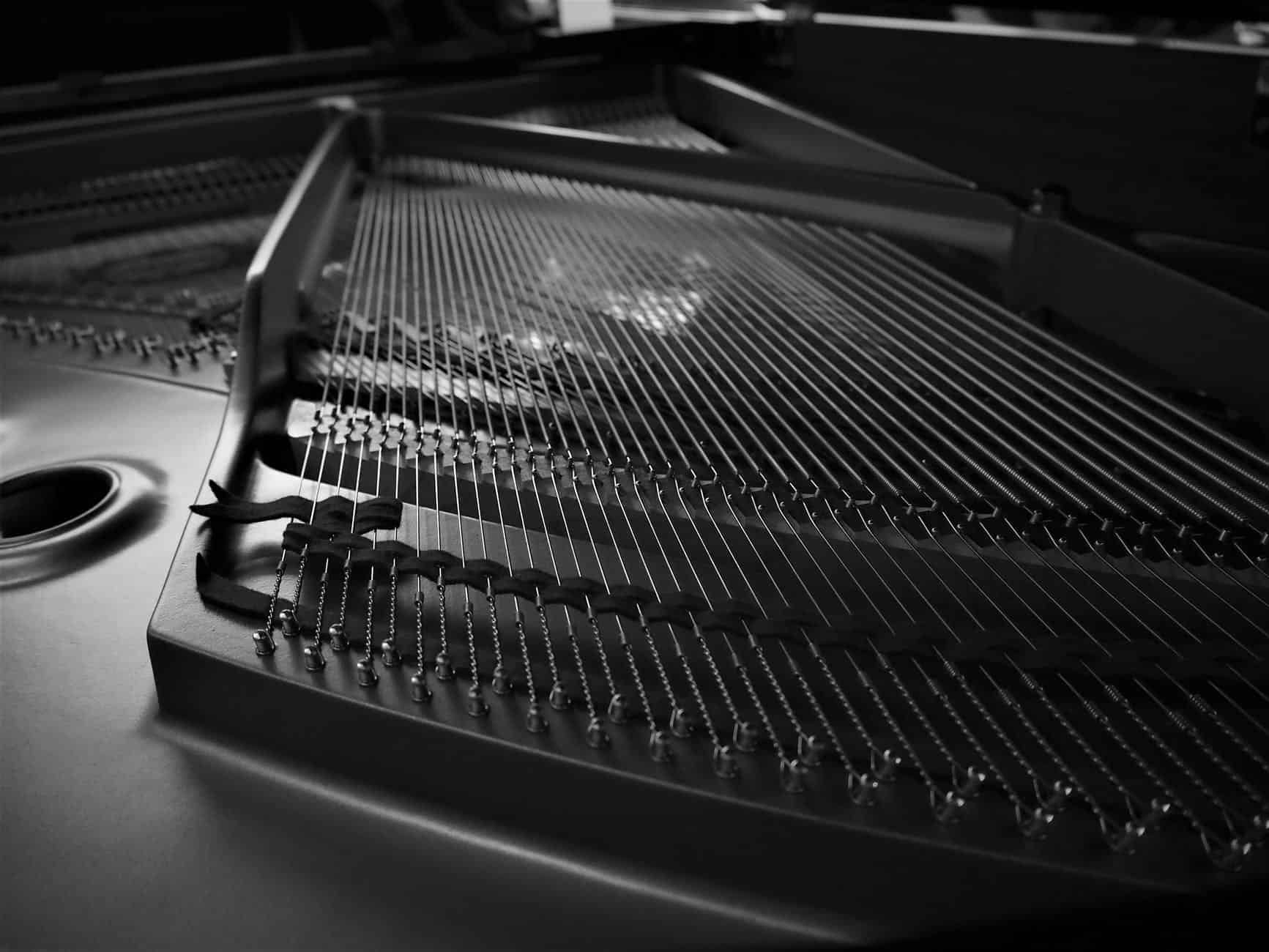For a musician, nothing hurts more than a broken instrument.
When a piano string breaks, it creates the most horrible sound and can never go unnoticed.
But as ugly as it is to hear, it’s also a pain to deal with.
Piano strings can break if they are not kept well.
Also there are some situations that might cause your piano strings to break.
They include things like old age, temperature fluctuations and more.
Plus, everyone knows how dangerous piano strings can be when they break.
They are sharp and shouldn’t be mishandled at any cost.
So, what should you do then?
Today, we will discuss everything about broken piano strings and how to repair them.
Why they break, how often it happens, and how you can prevent them from breaking; we’ll talk about everything!
Related: Check out this post I wrote on storing a piano in a garage.
Can Piano Strings Break?

Despite their strength and resilience to breakage, piano wires can break.
This breakage can be a result of natural wear and tear from use or a manufacturing defect.
If you play the instrument too aggressively, it may also lead to a broken string.
Here are a few other common reasons why piano strings break: Also this might lead to pianos changing their pitch
Old age
If your piano is more than 50 years of age, you should expect it to start breaking apart.
The tuning pins might begin to rust, and the strings will start to snap one by one.
Fluctuating temperatures
High temperatures, or continuously changing temperatures, are always unsuitable for a piano, especially its strings.
Excessive humidity
Excessive moisture around the instrument is also harmful to the strings and can lead to early damage.
As a result, you will witness a wire breaking sooner than expected.
Poor installation
If you or your professional didn’t install the wires correctly, they would snap or break.
It doesn’t necessarily mean that the wire was defective, as well.
The wire would fail and come apart, even if the installation process had its flaws.
Continuous touching the strings.
Your hands produce oils.
So, if you touch the strings with your bare hands too often, these oils can stimulate the steel wires to oxidize.
This oxidation is not a good thing for your metal wires.
They’ll start to rust and corrode, leading to premature breakage.
Also check out this article I wrote on if playing the piano can cause trigger fingers?
How Often Does A Piano String Break?
Contrary to what most people believe, a piano string is not as fragile as the word string implies.
These are steel wires that are stronger than you might think.
Hence, they don’t break as easily.
Defective wires snap quickly.
Even if they somehow escape the manufacturing process and the sellers, they give up within less than a decade, around approximately five years or so.
It depends on where the defect lies.
If it’s somewhere around the “pressure points,” it will snap sooner.
In contrast, piano wires that are perfect and free of defects when manufactured can work fine for decades and decades.
You will probably witness one string breaking in 10 or 50 years.
How Can You Prevent Piano Strings From Breaking?
In a nutshell, avoiding everything in the above list of causes can help prevent piano strings from breaking.
- Avoid touching the wires with your bare hands. Always wear gloves when you’re cleaning or touching the piano wires.
- Install dehumidifiers to ensure minimal to no moisture around the piano.
- Keep the instrument away from open windows and exposure to the outside environment.
- Make sure the piano sits somewhere with no exposure to sunlight or temperature fluctuations.
What Should You Do If A Piano String Breaks?
The first thing you should do when a piano string breaks is to wear gloves.
Do not touch the wires with your bare hands as it might be sharp and can cut you.
If you don’t have any knowledge or experience in this domain, don’t try to fix the string yourself and contact a professional for help.
However, if you can do it yourself, here is a way to do so:
- First things first, put on your gloves.
- Identify the broken piano string (it won’t be that hard! ) and remove it. Cut it down to its V-bar.
- Measure the length and width of the broken string and cut a new one accordingly. Give it a few extra inches to be safe.
- Utilize a dummy pin to help the new wire wrap around and form a coil.
- Feed the wire from one end under the V-bar, on the left tuning pin’s side, using a stringing crank.
- Then, take the other end after the wire to feed it through the tuning pin’s hole. Create two coils around the tuning pin and make sure it’s tight.
- Now remove the wire from the dummy pin and insert it inside the pinhole you had removed. Now, wrap up the wire around the V-pin and the hitch pin.
- Tighten the new string, and that’s it!
How Much Would It Cost To Replace A Piano String?
Replacing piano strings can be expensive; the average cost of replacing one wire is around 20 or $30.
Getting the entire piano fixed costs around $900 to $1300.
If your piano is old and you know that the rest of the strings will come apart soon, too, the best idea is to get all the wires replaced at a single cost.
The services included restringing the wires that need to be restrung and replacing tuning pins that need replacement.
Bass strings cost even more than that.
Plus, these costs depend on the material, size, length, and brand of the piano strings.
For example, grand piano strings are somewhat more expensive compared to upright piano strings.
Conclusion
Piano strings don’t break every day, but it’s not a rare sight either.
Whether the cause is natural aging or a manufacturing defect, it is normal for these metal wires to break.
Indeed, there are specific ways you can prevent it, and as mentioned above.
Even still, if your piano string breaks, don’t panic.
Ask for professional help.
Or, if you are confident enough, do it yourself using the process mentioned above.
It’s not as complicated as it may seem.
Just ensure that you know exactly what you’re doing and you have protective gloves on.
Piano wires can be sharp.
They might poke you or cut you badly if you’re not careful.



